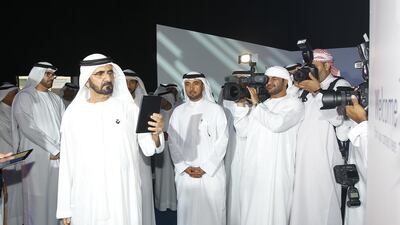BARCELONA // Etisalat's commitment to the Internet of Things (IoT) could result in the development of technology that will bring costs down and conserve battery life, helping to make Smart Dubai and other smart city projects a reality.
The use of such technologies over mobile networks will enable operators to capture about 47 per cent of the growing machine-to-machine market, representing up to US$589 billion by 2020, according to Machina Research, an IoT analyst firm.
Several smart technologies, including smart grid monitoring, smart agriculture projects, and pet trackers are on display at this year’s Mobile World Congress in Barcelona, from companies including Huawei, Intel and Ericsson.
Etisalat is one of the members of the GSM Association’s Mobile IoT Initiative, which agreed in December on technology standards for Low Power Wide Area (LPWA) – a series of technologies that operate over a wide area at little cost using unlicensed spectra to enable a range of small, low-powered objects to communicate with one another on a sporadic, non-critical basis.
The underlying technologies include Narrow Band IoT (NB-IoT), Extended Coverage GPRS and LTE Machine Type Communication.
“We see LPWA as a key enabler of IoT solutions and are leading the definition and adoption of global standards, which will drive economies of scale, consistency and innovation,” said Khalifa Al Shamsi, chief digital services officer for Etisalat Group. “A global standard for LWPA is critical for future success and Etisalat is at the forefront of making this a commercial reality.”
Re-using existing mobile networks for IoT is an attractive option, according to Matthew Reed, an analyst with Ovum consultancy in Dubai.
“In doing so, however, there is a risk of missing out on a segment of the market, so some operators are also building out new LPWA networks,” he said. “But just because some operators are deploying LPWA, that does not mean all should do so, with the case for or against LPWA will depend on the local requirements.”
Sheikh Mohammed bin Rashid, Vice President of the UAE and Ruler of Dubai, launched the Smart Dubai initiative in 2014, with the intention of transforming the city into the smartest metropolis in the world by 2017.
Early fruits of the initiative include last year’s announcement by the Roads and Transport Authority (RTA) that every traffic light in the city had been connected to a central command centre. By using cameras and sensors on busy roads, the timings of these lights can be altered to guide the flow of traffic in real time, easing congestion and directing people away from problem areas.
Industry analysts Gartner estimated that 1.6 billion connected things will be used by Smart Cities by the end of this year, a 39 per cent increase on 2015.
This month Etisalat Group and Huawei announced the establishment of a joint IoT innovation lab, focusing on service innovations utilising NB-IoT, with smart parking and connected car systems, smart metering and smart lamp poles some of the earliest projects under development.
Yesterday in Abu Dhabi, Etisalat shares rose 1.6 per cent to a new 52-week high of Dh16.60 each and are up 3.1 per cent for the year to date. The shares have surged since an announcement in June that the government would allow foreigners to own company shares, up to a limit of 20 per cent of the stock.
The shares last traded this high in April 2005.
jeverington@thenational.ae
Follow The National's Business section on Twitter

